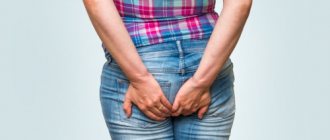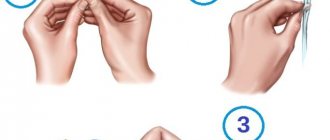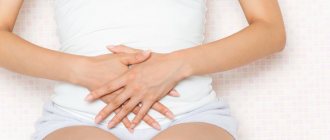Intestinal pain before menstruation: normal or pathological?
It is difficult to find a woman who is unfamiliar with pain before menstruation. As a rule, such a state is taken for granted. This is partly true. The body experiences hormonal surges, blood rushes to the internal organs, and all this does not happen without unpleasant sensations. But sometimes it’s difficult to figure out what exactly hurts before menstruation: the stomach, intestines, ovaries, rectum or something else. If the pain is synchronized with menstruation, that is, it goes away regularly after it ends, then most likely its cause is completely natural. If unpleasant sensations continue to haunt a woman, then perhaps we are talking about pathological changes. Be that as it may, it is difficult to understand what is happening on your own. You will need to consult a gynecologist, gastroenterologist and proctologist.
How is the intestines related to the arrival of menstruation?
In a normal state, before menstruation, hormone levels inevitably increase, as the body prepares for a possible pregnancy. A large amount of prostaglandins affects the condition of smooth muscles. The intestinal muscles relax, the stool becomes softer, and sometimes becomes completely liquefied. As a result, before the arrival of menstruation, many women suffer from indigestion. Sometimes this condition lasts until the end of menstruation.
Symptoms of bowel relaxation in women before menstruation:
- absence of severe abdominal pain;
- feces do not have a strong odor characteristic of food poisoning;
- stools are softer, more frequent, or heavier than usual;
- everything returns to normal after the end of menstruation or a couple of days later.
The state of the intestines is also influenced by the emotional background. Under the influence of hormones, a woman’s mood changes sharply, nervousness, causeless anxiety, irritation, etc. arise. Everyone has their own range of emotions, but the result is the same - the intestines suffer.
And if a woman is also under stress, is on a strict diet or overdoes it on calories, takes medications, is addicted to alcohol or is infected with helminths, the intestinal microflora literally goes on “strike”. This leads to the appearance of irritable bowel syndrome, in which a woman’s entire lower abdomen hurts, and there may be a general deterioration in well-being and frustration.
Read: what medications can be taken for diarrhea for adults and children.
Find out if you can eat buckwheat if you have acute pancreatitis.
“Fuel to the fire” is added by spasmodic contractions of the uterus, which, about a week before menstruation, begins to prepare for the rejection of the endometrium (the inner layer of the uterus to which the embryo is attached during pregnancy). Rejection occurs due to muscle contraction, creating sensations a bit like labor contractions. And since the intestines are located next to the uterus, some of the spasms fall on its share.
Important! To relieve pain caused by physiological causes, dietary and lifestyle adjustments may be sufficient. The unpleasant sensations will not disappear completely, but if shortly before your period you monitor your diet, give up alcohol and calm your nerves a little, then your critical days will pass much easier.
Causes and symptoms
As already noted, the main provoking factor in the occurrence of disorders of the gastrointestinal tract before menstruation is considered to be hormonal imbalance. It affects all organs and systems. Disorders are associated with the digestive process and have the form of bloating and diarrhea.
Usually such a pathological symptom leads to thoughts of food poisoning or some kind of disease, but in the premenstrual period the reasons for the appearance of loose stools are:
- the influence of the hormone progesterone, namely an increase in its amount;
- spasmodic processes in the intestines;
- relaxation of muscle fibers and increased blood flow to the pelvis;
- a syndrome called irritable bowel syndrome;
- changes in uterine tone;
- reflex digestive disorders.
Menstruation in the second phase of the cycle is accompanied by the release of an egg and the body’s preparation for a future pregnancy. There are changes in the tone of the muscle fibers of the uterus and tubes and a decrease in the tone of the vaginal muscles. In connection with the advancement of the egg and increased tone, the intestines are affected in the form of increased peristalsis. All this causes food to remain in the intestines for a shorter period of time, the process of digestion and absorption of liquid is disrupted, and this explains the situation of diarrhea before menstruation.
If diarrhea appears before menstruation, there is no need to panic, because in most cases it goes away within 1-3 days.
Fluctuations in progesterone have a significant impact on the gastrointestinal tract. In some women, in the second phase of the menstrual cycle, changes in appetite often appear, which leads to the formation of diarrhea. They can consume during a given period of time those foods that they did not like until now. As a result, the digestive system cannot adapt to such changes so quickly, and discomfort, bloating and diarrhea begin to manifest themselves.
Quite often, the premenstrual period is accompanied by a disturbance in the digestive process, which is of a reflex nature. Its appearance can be caused by:
- hormonal changes;
- reflex changes;
- changes to your usual diet and eating routine.
In this case, the woman begins to be bothered by painful sensations; their character is similar to menstrual pain. Their localization is the lower abdomen, but they can also radiate to the navel. A feature of irritable bowel syndrome is that diarrhea before menstruation appears in the morning, and over time it changes to constipation. Even with frequent urges to defecate, there remains a feeling that the intestines are not completely emptied.
Pain in the intestines not associated with menstruation
Before the arrival of menstruation, blood flows abundantly to the internal organs. One and a half to two weeks before “day X”, that same belly, unloved by all women, appears, which cannot be gotten rid of. This is preparation for a possible pregnancy. A large influx of blood, like a litmus test, reveals all the “problem areas”:
- inflammation or infection in the genital organs (there may be no symptoms, discomfort appears only when the problem spreads to neighboring organs);
- exacerbation of hemorrhoids (blood circulation worsens, stagnation occurs, pressure on the rectum increases);
- problems with the nervous system;
- diseases of the endocrine system.
Thus, the causes of pain in the intestinal area can both depend on the upcoming menstruation, and simply manifest themselves more acutely against its background. How to distinguish one from the other?
Pathology or physiology?
Each woman has her own spectrum of premenstrual pain. But there are some common symptoms that indicate the cause of the discomfort:
- if during menstruation it is the intestines that hurt, then problems with the gastrointestinal tract are likely;
- if a nagging pain, similar to contractions, is localized in the lower abdomen, then the matter is the body’s natural preparation for menstruation;
- the end of pain immediately after menstruation indicates its natural cause;
- prolonged discomfort, not synchronized with critical days, indicates pathology.
The intestines may react to the approach of critical days with grumbling, nausea, discomfort in the stomach, a coating appears on the tongue, and an unpleasant taste in the mouth. This is a consequence of some disease that is aggravated due to hormonal release. In advanced cases, such symptoms are accompanied by fever and a general deterioration in well-being.
We recommend that you find out what stool can look like with pancreatitis.
Read: How pancreatic lipomatosis manifests itself.
Find out why the right intestine hurts.
Diarrhea during missed period
Delayed menstruation and diarrhea often accompany each other. It should be noted that the combination of these symptoms does not appear just like that. Diarrhea and delayed menstruation occur due to the fact that the hormonal levels in a woman’s body change significantly. All systems and organs begin to prepare for pregnancy, and therefore the ratio of hormones begins to change. An increase in progesterone in the blood has a relaxing effect on the intestines and other organs of the digestive tract.
In addition, in addition to loose stools, other signs appear, such as headache, increased breast size, apathy, increased body fatigue, drowsiness and decreased performance. Diarrhea during pregnancy can last for a couple of months.
Know! Diarrhea with a delay in menstruation is a sure sign of pregnancy.
In the future, the stool will become harder, and even constipation is observed in the last months of pregnancy. Sometimes diarrhea appears before your period is missed, in which case it is too early to talk about pregnancy. You should wait 2-3 days; if your period does not arrive on time, you need to buy a pregnancy test. Often, with diarrhea and retention, a woman’s lower back is pulled, which is also a sign of pregnancy. In the first weeks, the egg is implanted, which is why pain occurs.
How to prevent intestinal discomfort?
If the pain is not caused by pathology, then about a week before the onset of menstruation, it is advisable for a woman to reconsider her diet. Ideally, the quality of food should be taken care of constantly, but even in a few days, small changes in the menu can be beneficial.
It is worth making a choice in favor of boiled, baked or steamed dishes, and forget about fried potatoes and meat for a while. Fast food, salty and spicy snacks, smoked and pickled foods, ready-made sauces, especially fatty mayonnaise and spicy ketchup, should also disappear from the diet for at least a few days. It is incredibly difficult to give up high-calorie desserts, whipped cream, chocolate and other sweets, but you have to if you want results.
It is advisable to replace alcoholic and carbonated drinks with herbal teas, fresh juices and natural water. If you are prone to constipation, fermented milk products, low-fat soups, and juices will help. And for diarrhea, you need dishes made from boiled rice and decoctions from it.
Important! You should not expect instant pain relief. It will take time and patience, but sooner or later the stomach and intestines will return to normal.
The main indicator for distinguishing pathology from premenstrual syndrome is the duration of symptoms. If they pass along with the end of menstruation, then the matter is in physiology. If the intestines, ovaries, stomach or other organs continue to hurt, then you cannot do without consulting a doctor. And you shouldn’t delay the examination. And premenstrual syndrome can be alleviated by properly selected meals and giving up bad habits, at least for a while.
Why is intestinal upset observed in the first days of menstruation?
Every month, millions of women all over the planet feel unwell: dizziness, aching pain in the lower abdomen, bad mood. Sometimes representatives of the fair sex complain of diarrhea, which very often occurs in the first days of the menstrual cycle. Why it happens, no specialist can definitely answer without an examination.
Many gynecologists do not consider the occurrence of diarrhea in the first days of the menstrual cycle to be a cause for concern. However, if you experience a similar symptom often and are accompanied by pain, it’s time to figure out the cause of diarrhea.
Colitis
An inflammatory process in the mucous membrane of the large intestine - colitis - often causes painful bowel movements in girls during menstruation. With this pathology, a person experiences a feeling of heaviness in the lower abdomen, increased gas formation, and sometimes cramping pain appears, which forces the patient to bend the body until the discomfort subsides.
With increased blood circulation in the pelvic organs before menstruation, the symptoms of the inflammatory process in the large intestine become more noticeable; when a woman wants to poop, a nagging pain appears in the lower abdomen, and during defecation it can give way to cramping. During the usual first few hours after going to the toilet, the discomfort becomes less noticeable.
Causes of diarrhea during menstrual periods
Do not forget that during the menstrual period the female body produces many hormones, which in one way or another individually affect the condition, thereby controlling the renewal of the uterine mucosa. Thus, under the influence of gestagens, the uterus begins to contract, freeing itself from its inner covering. Thus, the answer to the question - why intestinal upset occurs during menstruation can be:
- The manifestation of premenstrual syndrome is based on hormonal problems that can manifest themselves even before the onset of menstruation. There are many manifestations of PMS, ranging from physical to emotional. Intestinal upset is one of the most common signs of PMS. It is worth noting that in women with MPS, menstruation is much more difficult - mood swings, migraines, dizziness, flatulence, stabbing or cutting pain in the lower abdomen may occur;
- Increased blood circulation in the pelvis is one of the characteristic features of menstruation and can occur several days before its onset. The rush of blood makes the uterus more swollen. Increased blood circulation occurs due to hormones. The cause of diarrhea is that the uterus increases in size due to swelling and begins to put pressure on the intestines, thereby causing it to contract;
- Relaxation of the smooth muscles of the uterus - without it, contraction is impossible. During uterine contractions, a full intestine can interfere with its activity. Thus, on “women’s” days, the intestines are released much better than on ordinary days due to contraction of the uterus;
- High levels of prostaglandins - these substances also help the uterus contract. But in addition to contraction, they can provoke pain. If in the first days of the menstrual cycle a woman feels noticeable pain in the lower abdomen and intestinal upset occurs, the cause of this ailment is the high level of prostaglandins in her body. In addition, the substances also affect the intestines, relaxing its smooth muscles, thereby allowing feces to be most actively excreted from the body;
- Overeating and consumption of certain foods - women often complain that shortly before the start of the cycle and in the first days, they eat much more food than on normal days and they begin to crave sweet or salty foods. The uterus and intestines are located quite close to each other. In the first days, the uterus contracts, and the overcrowded intestines can put pressure on it, which in turn provokes pain and diarrhea. Eating sweet foods causes fermentation to begin in the intestines, causing flatulence and intestinal upset. And as a result of eating salty food, a person wants to drink more, which in turn causes swelling of the internal organs, making stool liquid;
- Pregnancy – Progesterone levels increase during pregnancy. Its high levels act as a laxative on the intestines. And the increased appetite, in turn, causes overflowing of the intestines and pressure on the uterus;
- Stress - everyone knows that shortly before the onset of menstruation, a woman reacts completely differently to various situations and becomes more irritable. A psycho-emotional state can affect the body, causing diarrhea.
However, despite the above reasons for the occurrence of diarrhea, before and during menstruation, if this symptom does not go away and begins to intensify, you should definitely undergo a female examination. Similar symptoms can occur with a bent uterus, endometriosis, algodismenorrhea, etc.
Pathological causes
To fully answer the question of why the intestines hurt during menstruation, it is necessary to consider not only natural causes, but also probable diseases. It may well be that intestinal soreness does not have a direct relationship with the female cycle, and arose as a result of some pathology. The disease may manifest itself more actively during menstruation, but this is where the whole relationship ends.
What can cause intestinal pain?
- Inflammation of the reproductive system, which began to spread throughout the body. Such inflammation could be asymptomatic and spread over time to other organs.
- Irritable bowel syndrome occurs for a variety of reasons (from poor nutrition to a lot of stress) and is manifested by poor health along with problematic bowel movements. There are also sharp pains when going to the toilet.
- Numerous diseases of the intestines themselves (colitis, enteritis, Crohn's disease, etc.).
- It is extremely rare for the intestines to hurt during menstruation due to a tumor, but this option should also be considered in order to exclude it from the list of possible problems.
- Diseases of the colon often radiate pain to neighboring organs.
- Problems with intestinal microflora.
- Blockage of the arteries supplying the intestines.
It is extremely difficult to determine on your own whether intestinal soreness is caused by a disease or natural causes. In both cases, the pain can be either minor or severe. Additional symptoms may narrow down the range of problems, but without consulting a doctor, this problem will not be solved. First you need to contact a gynecologist to rule out problems in the female part. Then it will be possible to consult with other specialists.
After conducting examinations and collecting tests, the doctor will find the cause of the problem. Sometimes it happens that diseases arise due to psychosomatic problems. In this case, a different level of treatment is required.
How to alleviate the condition?
If diarrhea is not caused by gynecological diseases, then exclude the following foods from your diet before menstruation:
- Kefir;
- Dried apricots;
- Beetroot;
- Plum;
- Vegetable juices;
- Cucumbers.
On critical days, try to monitor your appetite, eat less and in small portions. It is best to avoid causing diarrhea and eat only freshly prepared foods. Drink more purified boiled water, but do not exceed its consumption (the norm is 2 liters per day).
If diarrhea causes you severe discomfort, try simple foods that strengthen you: buckwheat porridge, strong black tea, meat broth, oatmeal, boiled rice, cottage cheese and crackers.
The use of medications to combat intestinal disorders is strongly discouraged. Do not use Imodium or other antidiarrheals. They can cause constipation, and as a result, flatulence and cramping pain. For severe pain, you can use antispasmodics, for example, “No-shpa”, “Spazmalgon” and others. They will eliminate pain and relieve spasms in the intestines and uterus. However, their frequent use can cause bleeding.
If you have a lot of pain in your lower abdomen and you often feel the urge to have a bowel movement, an infusion of valerian or peony will be a harmless and effective remedy for you, which will not only relax the nervous system, but also the body. During menstruation, other herbal infusions are not as effective as peony or valerian.
Usually 2-3 days after the start of menstruation, diarrhea and other symptoms disappear, and the body begins to function as usual. But, if during this time the intestinal disorder does not go away, you should sound the alarm.
To get rid of unpleasant syndromes, try to sleep more, reduce mental and physical stress, and spend more time in the fresh air.
Measures are aimed at eliminating the pathological symptom
If disorders of the digestive process during the premenstrual period do not lead to the appearance of discomfort in a woman, then in this case no measures can be taken to eliminate them. If diarrhea is accompanied by nausea, then before taking any medications you need to take a pregnancy test. This need is explained by the fact that the fetus is formed in the first trimester of pregnancy (especially in the first weeks), and it is very sensitive to medications and their negative impact can cause deviations in its development.
If diarrhea and abdominal cramps occur simultaneously, the best option is to take antispasmodic drugs, such as No-shpa. These medications have the ability to eliminate pain and restore the normal ability of the intestines to peristalsis.
It is necessary to emphasize that you can get rid of diarrhea before menstruation without taking medications. All you need to do is follow these simple recommendations, such as:
- It is necessary to increase the amount of liquid consumed per day. This will help restore the water-mineral balance of the body. It is allowed to drink teas, compotes and still water.
- It is necessary to avoid eating unfamiliar dishes and foods that may irritate the intestines.
- You should give preference to porridges cooked in water, cheese and unsweetened crackers.
- You should only eat freshly prepared food.
When should you see a doctor?
In cases where you:
- Diarrhea lasts more than 3 days;
- After the end of menstruation, the lower abdomen hurts and is accompanied by other premenstrual symptoms;
- The stool has an unpleasant odor, contains mucus or blood, and becomes darker in color.
Pain, intestinal cramps, and diarrhea themselves are common symptoms of the onset of menstruation. Before the start of a new menstrual cycle, a woman’s body begins to secrete a lot of hormones that provoke pain in the lower abdomen, flatulence, bad mood, etc. However, if at the end of your period you still have a stomach ache, frequent bowel movements and feel other ailments, consult a doctor immediately, because this may be symptoms of an intestinal infection, cystitis, gynecological disease, or simply a sign of poor digestion.
Infection or premenstrual syndrome?
An upset stomach may occur due to an infection entering the body. In this case, the signs of an intestinal or gastric disorder are very similar to the symptoms of premenstrual syndrome. The only difference is that the signs of an infectious disease are somewhat stronger. In general, the disorder manifests itself with the following symptoms:
- loose stools, which occur quite often;
- Strong headache;
- general weakness in the body;
- high body temperature;
- nausea;
- pain in the abdominal cavity;
- vomit.
Loose stools during menstruation, combined with the listed symptoms, can only be observed with extremely severe menstruation. In other cases, you should be concerned, since such signs should be attributed to manifestations of diseases. In this case, the infection must be detected as quickly as possible so as not to cause even more severe distress and spread of the infection.
You should also be concerned if diarrhea continues after your period. In this case, the color and smell of feces are of great importance. Alarming signs include streaks of blood, green and black inclusions, as well as a strong, unpleasant odor. If these signs are accompanied by severe abdominal pain, diarrhea is likely due to an exacerbation of the disease.
Loose stools during menstruation, combined with the listed symptoms, can only be observed with extremely severe menstruation. In other cases, you should be concerned, since such signs should be attributed to manifestations of diseases. In this case, the infection must be detected as quickly as possible so as not to cause even more severe distress and spread of the infection.
You should also be concerned if diarrhea continues after your period. In this case, the color and smell of feces are of great importance. Alarming signs include streaks of blood, green and black inclusions, as well as a strong, unpleasant odor. If these signs are accompanied by severe abdominal pain, diarrhea is likely due to an exacerbation of the disease.
Why do intestinal pain occur during menstruation?
Very often, at the end of the menstrual cycle, namely during the period itself, women experience all sorts of ailments. Some of them are normal, while others are pathological changes in the body. Difficulties in bowel function often arise. Pain in it can have different localization. Let's take a closer look at the possible preconditions for a painful intestinal condition and find out how it can be normalized.
Sometimes there is pain in the intestines during menstruation
The main causes of a painful attack
These pains, as a rule, are not intense and do not create severe discomfort. After your period stops, the discomfort usually disappears completely. They are considered to be the peculiarities of the body’s functioning during menstruation. Among the main physiological reasons for intestinal or abdominal pain before menstruation are poor nutrition, reaction from taking medications, intoxication from alcoholic beverages, etc.
I would especially like to note the fact that a slight deviation of the uterus in its direction during menstrual periods can lead to painful sensations in the intestines. The uterus puts a lot of pressure on the intestines and causes discomfort. However, it should be noted that this condition is extremely rare in women. More often, such symptoms hide ordinary food poisoning.
Most often, pain is associated with exacerbation of gastrointestinal diseases
In addition, before menstrual flow, the uterus actively contracts and prepares for the rejection of the previous layer of endometrium. This can also cause spasm in the lumbar region, as well as in the lower abdomen. Moreover, such pains are somewhat similar to contractions during labor and radiate to neighboring areas, near the intestines.
Exacerbation of diseases associated with the gastrointestinal tract is a more common cause of abdominal pain.
Sometimes during menstruation, women experience an increased urge to defecate, which is also accompanied by pain. The fact is that changes in hormonal levels also affect intestinal motility, causing either constipation or diarrhea. The same consequences are caused by elementary overeating or a significant change in the usual diet, also associated with “jumps” of hormones. Therefore, overload of the gastrointestinal tract may well provoke pain in the intestines during menstruation.
During menstruation, the organs located in the pelvis are filled with a larger volume of blood than usual. Because of this, there is strong pressure on the colon, and the person experiences pain.
The female genitals become engorged with blood, which puts pressure on the intestines, causing pain
Lack of water in stool
Under the influence of hormones, metabolic processes in a girl's body change during the premenstrual period - after ovulation, swelling of the face, chest, abdomen and legs is often observed.
Where does the body get this water from? It takes fluid from food and drink, accumulating it in muscle tissue. Normally, water should pass all the way to the intestines, be absorbed there and partially remain in the stool, making it moist (this greatly facilitates the process of defecation). Due to swelling and insufficiently moistened stool, a woman experiences cutting pain when defecating during menstruation, and sometimes constipation occurs.
Painful conditions
Pain in the intestinal area during menstruation can be not only physiological, but also pathological, since this may indicate a progressive disease. It is also possible that the pain syndrome is not associated with the menstrual cycle at all, but is caused by a disease that manifests itself during this period.
Other causes of intestinal pain include inflammatory diseases of the genitourinary system, as well as diseases of the intestines themselves, etc.
It is worth emphasizing that self-diagnosis is extremely undesirable. However, as with physiological symptoms and signs of disease, pain can be severe or minor. Only a correct diagnosis by a doctor, based on a number of additional symptoms, can reveal the true cause of the pain. For this you need consultations with a gynecologist, proctologist and therapist.
If the pain is severe, consult a doctor
How to distinguish a disease from the norm
Speaking about the difference between disease and pathology, it is useful to provide a table that indicates other common causes of both natural and painful conditions.
| Natural causes | Manifestations of the disease |
| Lack of progesterone | Intestinal infection syndrome |
| Elevated prostaglandin levels | Benign formations |
| Hormonal contraceptives | Colon disease |
| Endometrial rejection | Microflora disturbance |
| Side effects from taking medications | Blockage of the arteries that supply food to the intestines. |
Only after a series of analyzes and studies can we talk about the cause of the problem.
It often happens that during menstruation, pain in the intestines is caused by psychosomatic disorders.
An increase in temperature is a very alarming symptom
The surest signs of a pathological condition are the following changes:
- the temperature rises greatly;
- intoxication of the whole body;
- the person feels constant fatigue and weakness.
Such symptoms will not go away after the cessation of menstruation, and in the absence of medical help they will even intensify.
How to eliminate intestinal pain and prevent it
It is extremely difficult to deal with pain without knowing its cause. When the intestines hurt during menstruation, it is advisable to apply a certain set of measures that reduce the pain syndrome or even completely eliminate it.
For example, you can use infusions or decoctions from:
- horsetail;
- chamomile;
You can brew chamomile tea, it is useful for gastrointestinal diseases
- bear ears;
- mint;
- viburnum bark;
- raspberries (both berries and leaves).
In the pharmacy you can find herbal remedies or other medicines based on these components. Official medicine does not have an unambiguous relationship with such means, but such treatment cannot cause any harm.
Changing your diet towards a healthy and balanced diet is beneficial in principle, and especially during menstruation. This can ease the work of the gastrointestinal tract, especially if there is constipation or diarrhea. At the same time, it is useful to consume pureed soups, cottage cheese, kefir, fermented baked milk, carrot juice, and prunes.
For diarrhea, rice porridge or its decoction works well. In addition, on such days it is recommended to exclude garlic, fresh milk, boiled cabbage and other foods that cause active flatulence from the diet. Spicy dishes will promote increased blood circulation before the appearance of bleeding, so it is also advisable to avoid them.
Why does your stomach hurt and how to treat it, watch this video:
It is useful to pay special attention to oregano before menstruation. It not only eliminates pain symptoms, relieves spasms and inflammation, but also regulates the menstrual cycle as a whole.
If the pain is so severe that it becomes difficult to fully live with it, they resort to the use of painkillers. It is best if these medications are prescribed by a gynecologist or therapist.
Other measures that are useful as prevention include avoiding emotional and physical stress, a balanced diet (always useful), giving up nicotine, tobacco and alcohol, as well as taking medications wisely and in a timely manner.
Latest articles:
- Valerian for menstruation
Valerian for menstruation Valerian is known for its effect and is a well-known drug for those who want… - After pyelonephritis, a delay in menstruation. There was pyelonephritis and cystitis, can there be a delay in menstruation? Hello, Nastya Both pyelonephritis and...
- Irritable Bowel Syndrome and Pregnancy Irritable Bowel Syndrome in PregnancyIrritable bowel syndrome (IBS) is a condition accompanied by abdominal pain...
- Breast pain before menstruation Causes of breast pain before menstruation Every third woman complains that before the start of her menstrual cycle...
Prevention measures
In order to relieve the symptoms of diarrhea during menstruation, a woman needs to follow some preventive measures. In the second half of the menstrual cycle, you should switch to a special diet. The following products must be present in the diet:
- meat broths, preferably strong;
- cottage cheese;
- strong black tea;
- buckwheat, oatmeal;
- potato;
- crackers;
- White bread.
These products have a strong strengthening effect. Feces become harder. However, you should be careful about your diet and not overload your intestines with too heavy food, otherwise constipation and intestinal obstruction may occur.
The diet also includes the temporary exclusion of certain foods from the diet. During the period before your period you should avoid the following foods:
- cabbage;
- beet;
- cucumbers;
- legumes;
- alcohol;
- coffee;
- milk products;
- juices;
You can also swallow a few black peppercorns. To relieve pain caused by spasms in the intestines, you can use the herbal drug No-shpa.
Diarrhea during your period is completely normal. Many women suffer from this manifestation of critical days. This unpleasant symptom can be dealt with without resorting to medications. Other ways can also help relieve the condition.
Treatment for diarrhea includes dietary adjustments. You need to eat foods that have a binding effect and normalize the digestion process. These include:
- Black tea;
- rich meat broths;
- dishes made from buckwheat and rice cereals;
- natural grain cottage cheese;
- homemade crackers.
If you are very bothered by spasms, but you are sure that they are not caused by pathological causes, you can take painkillers that have an antispasmodic effect (No-shpa, Drotaverine). Remember that drugs like Loperamide and Imodium only fight the symptoms, not the root cause, so they should only be taken if absolutely necessary.











